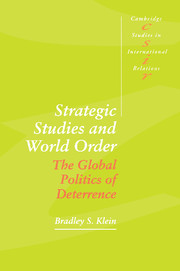1 - INTRODUCTION
Published online by Cambridge University Press: 06 July 2010
Summary
This book has its origins in the realization some years ago that the two fields in which I was most interested, social theory and strategic policy, seemed, in terms of the prevailing literature administered to graduate students at that time, to have little directly to say to one another.
Social theory was essentially occupied with issues of domestic policy – democracy, economic growth, theories of the state, and political legitimacy. Moreover, the range of concerns was largely confined to the so-called advanced industrial states, usually capitalist, but occasionally, socialist as well. The presumption was that the trajectory of Western culture had delivered most of the interesting questions to be addressed by apologists and critics of modernity. The pathologies usually attributed to these social orders were largely confined to issues seen as “internal,” so that domestic concerns were granted priority while international dimensions were relegated to other fields and neglected by social theorists themselves. The tradition of post-Marxist critical theory, from the Frankfurt School to Habermas, and including such French structuralists as Poulantzas and Althusser, was particularly egregious in its neglect of transnational issues. But post- Weberians, following the lead set by Parsons, were equally negligent in their oversight of global, transnational dimensions to problems besetting advanced industrial Western societies. Concerns with international trade and security, to say nothing of imperialism and militarization, were curiously left out of the debate. There was, in particular, no attempt to address the questions of war and peace so central to International Relations.
- Type
- Chapter
- Information
- Strategic Studies and World OrderThe Global Politics of Deterrence, pp. 1 - 12Publisher: Cambridge University PressPrint publication year: 1994

